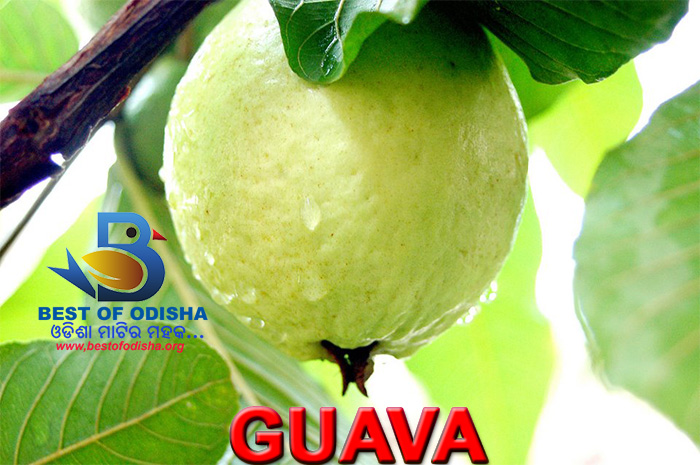Guava is another tropical fruit rich in nutrition. With its unique flavor, taste, and health-promoting qualities, the fruit easily fits in new functional foods category, often called “super fruits.”
It is an evergreen, tropical shrub or low-growing small tree probably originated in Middle Americas. Guavas actually thrive in both humid and dry climates and can tolerate brief periods of cold spells, but can survive only a few degrees of frost. Adaptability makes it a favorite commercial crop in some tropical areas.
Botanically, this wonderful fruit belongs to the family of Myrtaceae of the genus: psidium.
Scientific name: Psidium guajava.
Red varieties are indeed rich in carotenes and lycopene.
During each season the guava tree bears numerous round, ovoid or pear-shaped fruits that are about 5-10 cm long and weigh around 50–200 g. Different cultivars are grown all over the world which, vary widely in flavor, pulp color, and seediness.
The fruit is soft when ripe with sweet musky aroma and creamy in texture. Internally, the flesh varies in color depending up on the cultivar and may be white, pink, yellow, or red. Ripe fruits have rich flavor with sweet-tart taste. Each fruit contains numerous tiny, semi-hard edible seeds, concentrated especially at its center.
Health benefits of guava fruit
Guavas are low in calories and fats but contain several vital vitamins, minerals, and antioxidant poly-phenolic and flavonoid compounds that play pivotal role in prevention of cancers, anti-aging, immune-booster etc.
The fruit is very rich source of soluble dietary fiber (5.4 g per 100 g of fruit, about 14% of DRA), which makes it a good bulk laxative. The fiber content helps protect the colon mucous membrane by decreasing exposure time to toxins as well as binding to cancer causing chemicals in the colon.
Fresh guava-fruit is an excellent source of antioxidant vitamin-C; provides more than three times the DRI (daily-recommended intake). Outer thick rind contains exceptionally higher levels of vitamin C than central pulp.
Scientific studies shown that regular consumption of fruits rich in vitamin C helps body develop resistance against infectious agents and scavenge cancer causing harmful free radicals from the body. Further, the vitamin is required for collagen synthesis in the body. Collagen is the main structural protein in the body required for maintaining the integrity of blood vessels, skin, organs, and bones.
The fruit is very good source of Vitamin-A and flavonoids like beta-carotene, lycopene, lutein and cryptoxanthin. The compounds are known to have antioxidant properties and are essential for optimum health. Further, vitamin-A is also required for maintaining healthy mucus membranes and skin. Consumption of natural fruits rich in carotene is known to protect from lung and oral cavity cancers.
Studies suggest that lycopene in pink guavas prevents skin damage from UV rays and offers protection from prostate cancer.
Fresh fruit is a very rich source of potassium; contains more potassium than banana per 100 g of fruit weight. Potassium is an important component of cell and body fluids that helps controlling heart rate and blood pressure.
It is also a moderate source of B-complex vitamins such as pantothenic acid, niacin, vitamin-B6 (pyridoxine), vitamin E and K, and minerals like magnesium, copper, and manganese. Manganese is used by the body as a co-factor for the antioxidant enzyme, superoxide dismutase. Copper is required in the production of red blood cells.
Health benefits of Guava leaves
Aging and age related ailments
Guava leaves are enriched in antioxidants. Thus, it can aid in preventing as well as repairing cell damages caused by free radicals or oxidants, hence slowing the process of aging and decreasing the risk of age associated disease (like Cancer, Heart disease, Cataracts, osteoarthritis, Alzheimer’s disease, and macular degeneration).
Gastrointestinal Problems
The use of Guava leaves can stop diarrhea linked to bacteria such as Staphylococcus aureus, Salmonella spp. and Escherichia coli. It has also proved its efficacy in checking diarrhea in patients suffering from cholera.
A decoction prepared from Guava leaves ca boost production of digestive enzymes and prevent nausea and/ 0r vomiting.
Weight loss
Studies have established the use of Guava leaves in weight loss. It can benefit weight loss by stopping starch from changing into sugar.
Diabetes
Since ancient times Guava leaves have been used as herbal remedies to treat diabetes. It decreases the levels of glucose in the blood without altering insulin levels.
Allergies
Guava leaves contains anti-allergic properties and works by preventing the discharge of histamine.
General Health Benefits
1. Guava leaves reduces arthritis pain when use in the form of paste and a thick layer applied on the affected region.
2. Crushed Guava leaf when applied over the open wounds and sores speeds up the healing process and alleviates pain.
3. Chewing of fresh Guava leaves alleviates toothache.
4. Decoction of Guava leaves soothes sore throat when gargled with.
5. Decoction of Guava leaves when used as a mouthwash heals mouth sores and inflamed gums.
Other health benefits include treating acne, controlling blood pressure and cholesterol, boosting sperm production, treating hangovers and protecting the prostate.
0












2 Responses to GUAVA